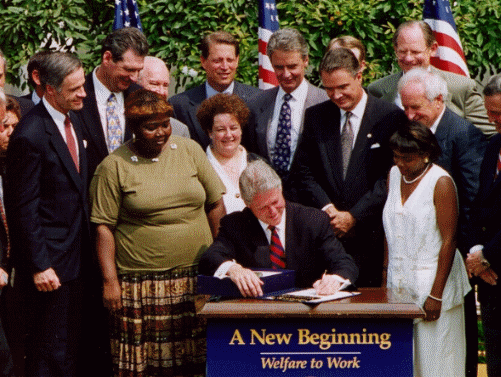Economist Hyman Minsky is often cited as the forerunner of the job guarantee movement. In order to get a better understanding of its origins, I decided to read a collection of his writings on the subject that was published by the Levy Institute in 2013. The title of the collection is “Ending Poverty: Jobs, Not Welfare” and unfortunately kind of tells you where Minsky is coming from on this stuff.
Minsky’s writing reveals a deep antipathy towards the War on Poverty, transfer payments, and the welfare state more generally. In his 1975 work “The Poverty of Economic Policy,” he writes that “a most striking aspect of the irrelevance and wrongheadedness of policy has been the recourse to the dole, not only in response to the current recession, but over the long run.” To clarify, he explained further that “a dole is the handing out of cash or services where nothing is required in exchange for the handout.”
Minsky goes on to describe welfare state measures as “the anti-employment thrust to policy,” a phrase that he uses to describe both benefit programs for able-bodied adults like AFDC, unemployment insurance, and food stamps and shifts to keep kids in school longer and lower the retirement age.
One striking characteristic of policy over the past 40 years has been a consistent thrust toward the generation of income independent of current labor market participation. If an economy is felt to be unable to generate a sufficient number of jobs to employ all who are willing and able to work under one set of social rules, then one way to eliminate unemployment is to change the social rules so that labor market participation is decreased. Raising the school-leaving age and improving retirement benefits [while lowering the eligibility age] is one tack; another is to improve the money income that is available independent of labor market participation. Welfare, unemployment insurance, and food stamps are additional elements in the anti-employment thrust to policy.
His arguments against welfare payments did not only focus on how they discourage employment. For instance, he writes that “[the food stamp program] is an example of how excessive sentimentality affects policy, and in addition of how a poorly thought-out policy effort that reflects good intentions has undesirable side effects. The food stamp program is a significant factor generating the inflation that has so troubled us in the past several years.” He is referring here to the global stagflation of the 1970s, which mainstream economists tend to attribute to the oil crisis of the period.
When he goes on to discuss his proposal, he does so under the heading “Reform of Transfer Payments” and specifically positions his proposal as being counter to the “transfer payment mess,” by which he means the welfare state.
The transfer payment mess cannot be handled by piecemeal changes. Thoroughgoing reform, based upon an understanding of how our economy works and principles consistent with human dignity and independence, is needed. The principles that should underlie the reform are an affirmation of both the dignity of labor and the social value of receiving income as a right because it is earned. Thus, thoroughgoing reform requires the manipulation of the economy so that there are jobs for all — the young, able-bodied adults, the handicapped, and the aged. Very few should be excluded by principle from the dignity which comes from a realization of their worth through doing a job. [Emphasis mine]
The idea that dignity and social value only comes from “earned success,” by which it is meant labor income, is of course the signature view of AEI president Arthur Brooks who, like Minsky, frowns upon welfare payments because they supposedly do not deliver earned success. How capitalists manage to live with themselves despite receiving huge quantities of non-labor income remains mysterious.
I have also emphasized “the aged” because Minsky really does mean that we need to get more elderly people working again. “Social Security is another transfer payment scheme that has to be brought under control,” he writes. Minsky does not seem to think it is practical (or perhaps desirable) to eliminate Social Security, but he does think that allowing the elderly into the job guarantee program “should enable us to end the pressure for ever-escalating [Social Security] benefits.”
I have emphasized “the young” because Minsky really does mean we should pull kids out of school and put them into jobs: “If 40,000 young men and women who do not want to be in school and who are unemployed with no immediate job prospects were removed from the New York City school system and streets, the task for the schools and the public order authorities would be eased.”
Lest any of the above leave any doubt about what Minsky thinks about welfare and its interaction with his job guarantee plan, he lays it out pretty clearly in a single-sentence paragraph near the end of this section:
The guarantee of an income through a job is the first step toward the elimination of the welfare mess.
He emphasizes again in the very last sentence of the section:
A job-based, rather than a transfer-based, strategy against poverty is a first and vital step toward making our economy work better.
It’s clear that Minsky viewed the job guarantee as a welfare state replacement program, at least in significant part. His views on welfare would today be classified as quite right-wing and are also just empirically wrong. The Columbia measure — a poverty metric based on the Supplemental Poverty Measure that includes transfer payments in its income definition — shows that poverty declined from 26 percent in 1967 to 16 percent in 2012, a fall of nearly 40 percent. Over the same period, poverty measured by market income did not fall at all and indeed ticked up slightly, meaning that the welfare state is solely responsible for the significant decline in poverty over the period.

